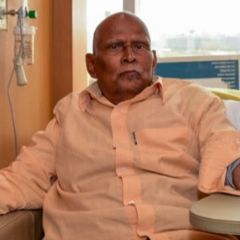"Best Oncologist in Delhi Dr. Sajjan Rajpurohit is one of the best cancer doctors I've ever had. He has always been there when I needed him, whether helping me with my diagnosis or just giving me regular checkups. I'm very pleased with his services and would highly recommend him to any of my friends."

Colorectal Cancer Specialist Doctor in Delhi
Colon cancer is also called rectal cancer, depending on where it develops. Rectal and colon cancer have many characteristics and are often combined.
What are Colon and Rectal?
Understanding colon cancer helps to understand the normal structure and function of the colon and rectum. The colon and rectum form the colon (or colon).
The colon (or colon) is part of the digestive system and is also known as the gastrointestinal tract (GI) (see image below). Most of the colon consists of the colon, which is a muscular tube about 1.5 meters long.
Read more about Colorectal Cancer
The parts of the colon are named for the way food passes through them.
- The first part is called the two ascending points. It starts in a pocket called the colon, where indigestible food enters the small intestine. Continue to the right side of the abdomen (abdomen).
- The second part is called the transverse colon. Cross your body from right to left.
- The third part is called a descending colon because it descends (descends) from the left side.
- The fourth part is S-shaped, so it is called a sigmoid. The sigmoid colon is associated with the rectum, which connects to the anus.
The ascending and transverse part is collectively referred to as the proximal colon. Descending colon and sigmoid colon are called Distal colon
STAGES OF COLORECTAL CANCER:
There are FIVE(5) main stages of COLORECTAL Cancer, starting at ZERO and going up to four. They are often written with the Roman Numerals I, II, III, and IV. Generally, we can say the lower the number, the less cancer has spread.
0 STAGE COLON CANCER
Stage O Colon cancer basically found in the innermost lining of the Colon, Called the Mucosa.
STAGE I Colon Cancer
In stage I Colon Cancer means that the tumor has spread beyond the inner lining but remains within the colon and has not spread to lymph nodes. Lymph nodes are small organs that are part of the immune system and act as filters.
STAGE II Colon Cancer
Stage II colon cancer extends through the thick outer muscle layer of the colon but has not spread to the lymph nodes.
STAGE III Colon Cancer
Stage III colon cancer has spread outside the colon to one or more lymph nodes.
STAGE IV Colon Cancer
Stage IV colon cancer has spread to other parts of the body, such as the liver or lungs. Cancer may be in the lymph nodes.
SYMPTOMS OF COLORECTAL CANCER
Colorectal cancer may not cause symptoms in the early stages. If it does, they may include
- Changes in bowel habits
- Diarrhea
- Constipation
- A feeling that the bowel does not empty fully
- Blood in feces that makes it look dark brown or black
- Bright red blood from the rectum
- Abdominal pain and bloating
- Feeling full, even when a long time has passed since a meal
- Fatigue or tiredness
- Unexplained weight loss
- Anemia
Treatments of Colorectal Cancer
Surgery
In the early stages of colorectal cancer, it may be possible for your surgeon to surgically remove the cancerous polyps. During surgery, if the polyp does not attach to the surface of the intestine, your chances of the surgery being successful will increase.
Read more about Robotic Surgery
Chemotherapy
Chemotherapy uses drugs to destroy cancer cells. In the case of colorectal cancer, chemotherapy is a common treatment after surgery to kill any remaining cancer cells. Chemotherapy controls the growth of your tumor and provides relief from the symptoms of last-stage cancer.
Read more about Chemotherapy
Radiation
Radiation therapy uses a powerful beam of energy, similar to that used in X-rays, to identify and destroy cancer cells before and after surgery. Radiation treatment is usually combined with chemotherapy.
Read more about Radiation Therapy
Medicines
In September 2012, the Food and Drug Administration (FDA) of the United States of America approved the treatment of metastatic cancer or end-stage colorectal cancer that does not respond to other types of treatment and has spread to other parts of the body. Stivarga - approved Stivarga drug (regorafenib). This medicine blocks enzymes that promote the growth of cancer cells.

About Dr. Sajjan Rajpurohit
Dr. Sajjan Rajpurohit has been a practicing physician for the past 22 years. He is a qualified MBBS with MD in Medicine and DNB in Medical Oncology and currently he is Director of Medical Oncology at BLK Super Speciality Hospital.





